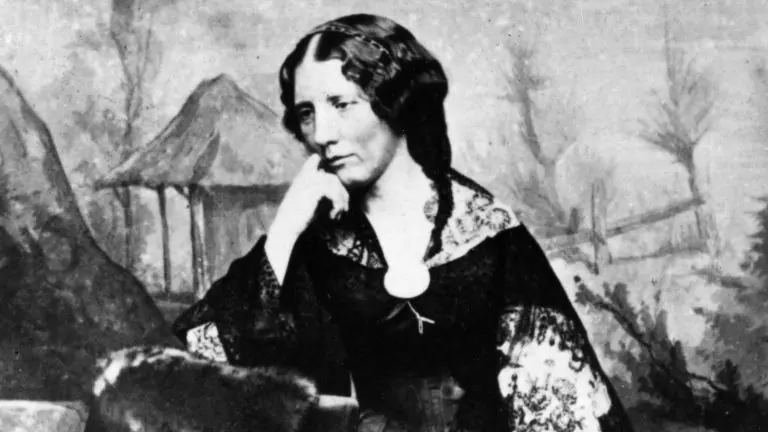210 years since the birth of Harriet Beecher Stowe
Every child who has started reading knows her name. Because she is the author of one of the most beloved children’s novels – “Uncle Tom’s cabin”. Her name is Harriet Elizabeth Beecher Stowe – an American writer, mother of many children, free-thinking person and fighter against the slavery of colored people in America. Lincoln called her “the little woman who started the great war.”
She is emancipated and courageous, and no one suspects that she has struggled with anxiety throughout her conscious life. She died mentally ill. On June 14 this year It is 210 years since the birth of Harriet Beecher Stowe. She was born on this day in 1811. He is the author of more than 30 books in various genres, many essays, poems, articles and anthems.
Harriet Beecher Stowe was born in Lichfield, Connecticut, to a pastor. Her mother, Roxana Beecher, died when she was just five. Her father, Calvinist preacher Lyman Beecher, had a total of 13 children from two marriages. 11 of them survive to adulthood. From his marriage to Roxana Beecher, he had eight children – two girls and six boys. Lyman Beecher openly preached against slavery. All seven of his sons followed him on this mission. One of his sons, Henry Ward Beecher, even became directly involved in the abolitionist movement in Nebraska and Kansas and sent them weapons hidden in Bible boxes.
At 25, he married the widowed husband of his girlfriend, Calvin Ellis Stowe, also a teacher. For the first few years, they lived in poverty, but Harriet was respected for her husband’s culture, although some of her biographers later suggested that she “knew languages and nothing else.”
Raised in a large family where the children share and help, Harriet also wanted her husband to have many children. In 14 years she has given birth to seven children and takes care of the home so that her husband can do his job in peace. She herself does not allow the care of the children to hinder her growth as a person. Meanwhile, cholera took the life of one of her children at an early age. Little Samuel, her sixth child, died of cholera in 1849.
This tragic event crushed her – she suffered the loss badly, but she had to accept God’s will and not to shake her faith. She found solace in home care and intellectual pursuits. You were constantly setting new goals. Together with her sister, they wrote a textbook on geography – “Geography for children”.
Her first publications were in a magazine. He began publishing his short stories and essays in a magazine, and even won a literary award from the Western Montley Shop. In 1843 he published his first book, Mayflower, after the Puritan settlers in America. In 1850, her husband Calvin Stowe received an offer of a professorship in Maine, and the family moved there.
In the same year, the US Congress passed a law against the escape of slaves and against the citizens who assisted them. Civil protests begin. Outrage is rising in many states in America.
It was then that Stowe’s idea for the novel “Uncle Tom’s Cabin” was born.
Harriet Beecher Stowe already had a name after the positive response to her publication “The Freeman’s Dream: A Parable”, for which she received as much as $ 100 from the editor of “The National Era” newspaper. , The National Era paid Stowe a fee of $ 300 for the 43 chapters of Uncle Tom’s Cottage, published on March 20, 1852, and sold 10,000 copies in the first week alone. By the end of the same year, another 300,000 had been sold, and there was even more interest in the work in the United Kingdom, where 1.5 million copies of the book had been sold in one year. Stowe received ten cents for each piece sold. According to an article in the London Times, published six months after the publication of the novel, in that period alone the writer already had more than 10 thousand dollars in copyright.
“We think this is the largest amount a writer has ever received, whether American or European, from selling a single work in such a short period of time,” the newspaper said.
“Uncle Tom’s Cabin” is being translated all over the world. It is translated into 40 languages. Among these translations, there were some that were not authorized. Stowe filed a lawsuit against the publisher of the Philadelphia-based German-language newspaper, the Free Press, FW Thomas.
Her income from “Uncle Tom’s Cottage” allowed her to buy a winter house in 1867 in Mandarin, Florida. Some point to a fact about this property, namely that the mansion was maintained by slaves before the writer bought it, and consider it paradoxical. She herself viewed this fact in a completely opposite way – that the energy of this place, created by the labor of the people for whose rights she, her brothers and father fought, deserves to be inhabited by people like her, not by slaveholders. For her, the mansion was something of a symbol of victory over slavery. Point of view.
The most glorious moment in the writer’s life was her meeting in the White House with President Abraham Lincoln, in the first days of the Civil War – in 1862. He greets her kindly, and notes with sympathy her small stature with an ingenious joke: “So you are the little woman from whom the great war began!”. According to some sources, the exact phrase is, “So this is the little woman who got us into this great civil war,” but anyway, the meaning of both expressions is the same. Their meeting was friendly.
The novel, the comments about him and the meeting with the president turn the writer into a celebrity. She receives invitations from many publications to work for them. Harriet Beecher Stowe became the most famous woman in America. Everyone admires her courage.







